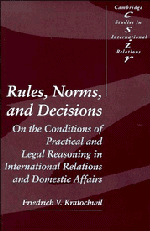 Rules, Norms, and Decisions
Rules, Norms, and Decisions Published online by Cambridge University Press: 01 June 2011
RULE-TYPES AND EXPLAINING RULE-FOLLOWING
Why do actors follow rules? The argument developed in the previous chapter appears to provide an easy answer to this problem. Having stressed the problem-solving character of rules as their generic feature, we seem justified in arguing that all norms are simple instruments for arriving at a decision. By typifying and simplifying situations, rules serve as guides for action. The obvious example in this context was the instruction-type rule. Taking instruction-type rules as the prototype or model of all rules, however, would be seriously misleading because the grammar of “following a rule” is considerably wider than that of attaining one's goals through instrumental guidance. Different types of rules exist and function often “heteronomously,” i.e., instruct us what interest of others we have to take into account while making our choices. Under these circumstances instrumental explanations fail. Consider the precept of “do not lie,” which is supposed to counteract the powerful incentive “to have one's cake and eat it too.” While everybody agrees that everybody is better off in a world that works on the presumption of mutual veracity, it is obviously often to the advantage of the individual to lie. Attempts at explaining the adoption of such precepts in terms of the long-term “rational self-interest” of the actor run into serious difficulties, which already puzzled Hume.
Furthermore, unless one makes a whole host of additional (and often quite implausible) assumptions the adoption of a “regime” cannot be satisfactorily explained by utilitarian arguments.
To save this book to your Kindle, first ensure no-reply@cambridge.org is added to your Approved Personal Document E-mail List under your Personal Document Settings on the Manage Your Content and Devices page of your Amazon account. Then enter the ‘name’ part of your Kindle email address below. Find out more about saving to your Kindle.
Note you can select to save to either the @free.kindle.com or @kindle.com variations. ‘@free.kindle.com’ emails are free but can only be saved to your device when it is connected to wi-fi. ‘@kindle.com’ emails can be delivered even when you are not connected to wi-fi, but note that service fees apply.
Find out more about the Kindle Personal Document Service.
To save content items to your account, please confirm that you agree to abide by our usage policies. If this is the first time you use this feature, you will be asked to authorise Cambridge Core to connect with your account. Find out more about saving content to Dropbox.
To save content items to your account, please confirm that you agree to abide by our usage policies. If this is the first time you use this feature, you will be asked to authorise Cambridge Core to connect with your account. Find out more about saving content to Google Drive.